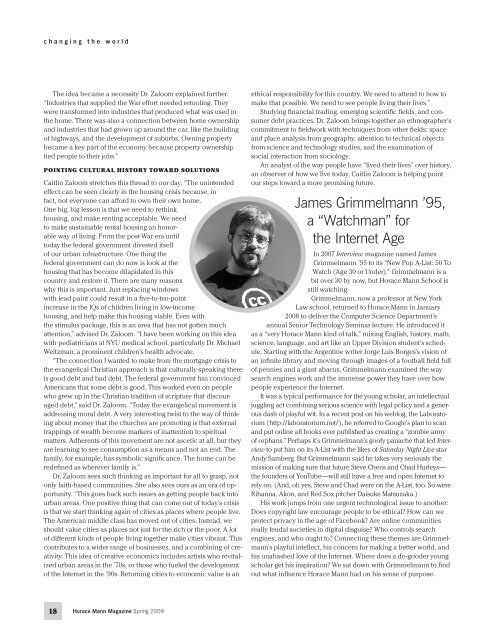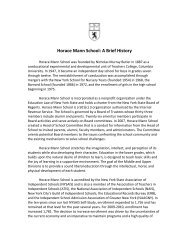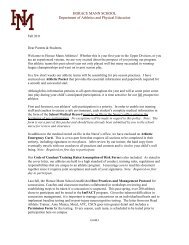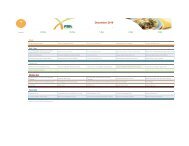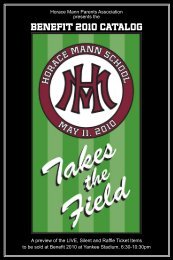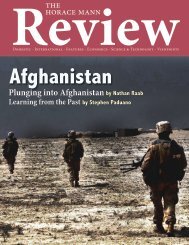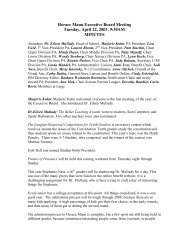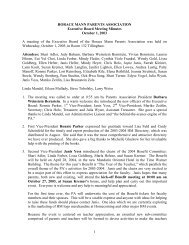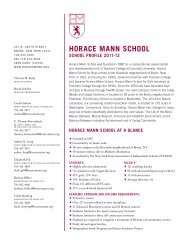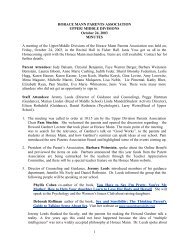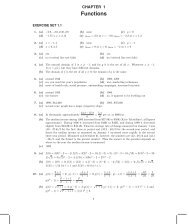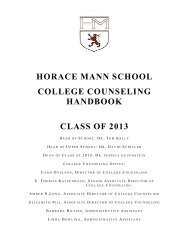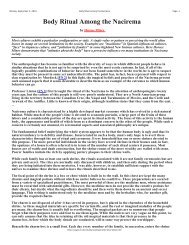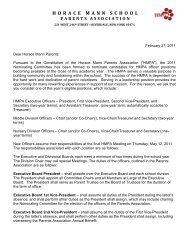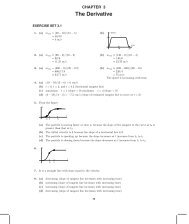You also want an ePaper? Increase the reach of your titles
YUMPU automatically turns print PDFs into web optimized ePapers that Google loves.
changing <strong>the</strong> world<br />
The idea became a necessity Dr. Zaloom explained fur<strong>the</strong>r.<br />
“Industries that supplied <strong>the</strong> War effort needed retooling. They<br />
were transformed into industries that produced what was used in<br />
<strong>the</strong> home. There was also a connection between home ownership<br />
and industries that had grown up around <strong>the</strong> car, like <strong>the</strong> building<br />
of highways, and <strong>the</strong> development of suburbs. Owning property<br />
became a key part of <strong>the</strong> economy because property ownership<br />
tied people to <strong>the</strong>ir jobs.”<br />
Pointing cultural history toward solutions<br />
Caitlin Zaloom stretches this thread to our day. “The unintended<br />
effect can be seen clearly in <strong>the</strong> housing crisis because, in<br />
fact, not everyone can afford to own <strong>the</strong>ir own home.<br />
One big, big lesson is that we need to rethink<br />
housing, and make renting acceptable. We need<br />
to make sustainable rental housing an honorable<br />
way of living. From <strong>the</strong> post-War era until<br />
today <strong>the</strong> federal government divested itself<br />
of our urban infrastructure. One thing <strong>the</strong><br />
federal government can do now is look at <strong>the</strong><br />
housing that has become dilapidated in this<br />
country and restore it. There are many reasons<br />
why this is important. Just replacing windows<br />
with lead paint could result in a five-to-ten-point<br />
increase in <strong>the</strong> IQs of children living in low-income<br />
housing, and help make this housing viable. Even with<br />
<strong>the</strong> stimulus package, this is an area that has not gotten much<br />
attention,” advised Dr. Zaloom. “I have been working on this idea<br />
with pediatricians at NYU medical school, particularly Dr. Michael<br />
Weitzman, a prominent children’s health advocate.<br />
“The connection I wanted to make from <strong>the</strong> mortgage crisis to<br />
<strong>the</strong> evangelical Christian approach is that culturally-speaking <strong>the</strong>re<br />
is good debt and bad debt. The federal government has convinced<br />
Americans that some debt is good. This worked even on people<br />
who grew up in <strong>the</strong> Christian tradition of scripture that discouraged<br />
debt,” said Dr. Zaloom. “Today <strong>the</strong> evangelical movement is<br />
addressing moral debt. A very interesting twist to <strong>the</strong> way of thinking<br />
about money that <strong>the</strong> churches are promoting is that external<br />
trappings of wealth become markers of inattention to spiritual<br />
matters. Adherents of this movement are not ascetic at all, but <strong>the</strong>y<br />
are learning to see consumption as a means and not an end. The<br />
family, for example, has symbolic significance. The home can be<br />
redefined as wherever family is.”<br />
Dr. Zaloom sees such thinking as important for all to grasp, not<br />
only faith-based communities. She also sees ours as an era of opportunity.<br />
“This goes back such issues as getting people back into<br />
urban areas. One positive thing that can come out of today’s crisis<br />
is that we start thinking again of cities as places where people live.<br />
The American middle class has moved out of cities. Instead, we<br />
should value cities as places not just for <strong>the</strong> rich or <strong>the</strong> poor. A lot<br />
of different kinds of people living toge<strong>the</strong>r make cities vibrant. This<br />
contributes to a wider range of businesses, and a combining of creativity.<br />
This idea of creative economics includes artists who revitalized<br />
urban areas in <strong>the</strong> ’70s, or those who fueled <strong>the</strong> development<br />
of <strong>the</strong> Internet in <strong>the</strong> ’90s. Returning cities to economic value is an<br />
ethical responsibility for this country. We need to attend to how to<br />
make that possible. We need to see people living <strong>the</strong>ir lives.”<br />
Studying financial trading, emerging scientific fields, and consumer<br />
debt practices, Dr. Zaloom brings toge<strong>the</strong>r an ethnographer’s<br />
commitment to fieldwork with techniques from o<strong>the</strong>r fields: space<br />
and place analysis from geography, attention to technical objects<br />
from science and technology studies, and <strong>the</strong> examination of<br />
social interaction from sociology.<br />
An analyst of <strong>the</strong> way people have “lived <strong>the</strong>ir lives” over history,<br />
an observer of how we live today, Caitlin Zaloom is helping point<br />
our steps toward a more promising future.<br />
James Grimmelmann ’95,<br />
a “Watchman” for<br />
<strong>the</strong> Internet Age<br />
In 2007 Interview magazine named James<br />
Grimmelmann ’95 to its “New Pop A-List: 50 To<br />
Watch (Age 30 or Under).” Grimmelmann is a<br />
bit over 30 by now, but <strong>Horace</strong> <strong>Mann</strong> <strong>School</strong> is<br />
still watching.<br />
Grimmelmann, now a professor at New York<br />
Law school, returned to <strong>Horace</strong> <strong>Mann</strong> in January<br />
2008 to deliver <strong>the</strong> Computer Science Department’s<br />
annual Senior Technology Seminar lecture. He introduced it<br />
as a “very <strong>Horace</strong> <strong>Mann</strong> kind of talk,” mixing English, history, math,<br />
science, language, and art like an Upper Division student’s schedule.<br />
Starting with <strong>the</strong> Argentine writer Jorge Luis Borges’s vision of<br />
an infinite library and moving through images of a football field full<br />
of pennies and a giant abacus, Grimmelmann examined <strong>the</strong> way<br />
search engines work and <strong>the</strong> immense power <strong>the</strong>y have over how<br />
people experience <strong>the</strong> Internet.<br />
It was a typical performance for <strong>the</strong> young scholar, an intellectual<br />
juggling act combining serious science with legal policy and a generous<br />
dash of playful wit. In a recent post on his weblog, <strong>the</strong> Laboratorium<br />
(http://laboratorium.net/), he referred to Google’s plan to scan<br />
and put online all books ever published as creating a “zombie army<br />
of orphans.” Perhaps it’s Grimmelmann’s goofy panache that led Interview<br />
to put him on its A-List with <strong>the</strong> likes of Saturday Night Live star<br />
Andy Samberg. But Grimmelmann said he takes very seriously <strong>the</strong><br />
mission of making sure that future Steve Chens and Chad Hurleys—<br />
<strong>the</strong> founders of YouTube—will still have a free and open Internet to<br />
rely on. (And, oh yes, Steve and Chad were on <strong>the</strong> A-List, too. So were<br />
Rihanna, Akon, and Red Sox pitcher Daisuke Matsuzaka.)<br />
His work jumps from one urgent technological issue to ano<strong>the</strong>r:<br />
Does copyright law encourage people to be ethical? How can we<br />
protect privacy in <strong>the</strong> age of Facebook? Are online communities<br />
really feudal societies in digital disguise? Who controls search<br />
engines, and who ought to? Connecting <strong>the</strong>se <strong>the</strong>mes are Grimmelmann’s<br />
playful intellect, his concern for making a better world, and<br />
his unabashed love of <strong>the</strong> Internet. Where does a do-gooder young<br />
scholar get his inspiration? We sat down with Grimmelmann to find<br />
out what influence <strong>Horace</strong> <strong>Mann</strong> had on his sense of purpose.<br />
18 <strong>Horace</strong> <strong>Mann</strong> Magazine Spring 2009


